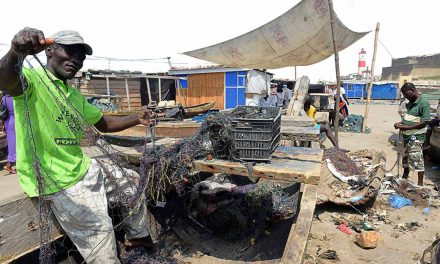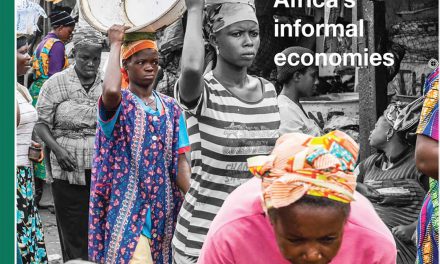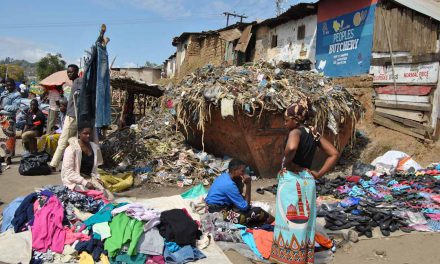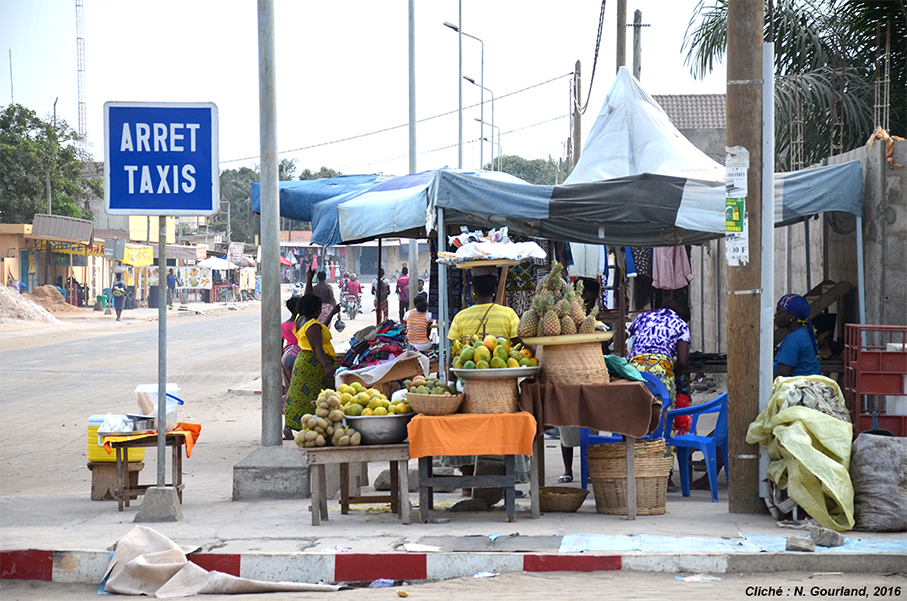
Retailers offer goods for sale at the roadside in Image: Blamé Ekoue
The government’s plans to tax the country’s informal businesses is costing jobs
For a long time, Togolese authorities have praised the informal sector for the role it has played in keeping the country’s economy afloat since 1993, when the European Union imposed economic sanctions on the country for its lack of progress in implementing democratic reforms. Those sanctions were lifted in 2007 after the country held legislative polls that the European Union deemed credible and transparent.
According to the country’s General Directorate for Statistics and National Accounts (DGSCN), Togo’s informal sector has four main sub-sectors: handicraft (27,4%), trade (19,7%), agriculture and husbandry (16,3%) and construction and public works (2,7%). The sector accounts for about 40% of Togo’s GDP, as well as playing a major role in socioeconomic life. Many young graduates find themselves earning a living in the informal sector while seeking jobs in the private or public sectors.
Interestingly, small enterprises in the informal sector can participate in tender processes for public works and construction programmes. For example, small informal businesses have supplied the state with clay bricks and pavement materials because no registered companies were manufacturing these items. In this way, the government is sometimes compelled to deal with informal businesses.
In 2012, the government established the Togo Tax Authority (OTR) as part of economic reforms aimed at improving tax collection across a range of primary economic sectors, including agriculture, animal husbandry and fishing. The OTR, a merger between the custom and excise and the tax office, was also mandated to increase levels of tax collection by registering all businesses operating in the informal sector.
The new policy aims to boost the government fiscus to help finance development needs, according to the ministry of finance and economy. “Togo’s investment in infrastructure [was] badly affected by the suspension of international cooperation in 1993. Domestic revenue is the main source of financing government expenditure in general, and capital expenditure in particular. Hence the urgent need to increase domestic revenues. Failure to do so will compel the government to slow down its infrastructure development programme,” says Ketoglo Anumu, head of the provision department at the ministry of finance and economy.
Since 2012, tax revenues have increased from CFA516 billion ($92 million) in 2015 to CFA578 billion ($1.03 billion) in 2016 and are expected to reach CFA625 billion ($1.11 billion) in 2017. The country’s largest opposition parliamentary party, the Alliance Nationale pour le Changement (“National Alliance for Change” (ANC)), agreed with the government’s decision to compel some small businesses to pay their taxes, but with reservations.
“I think it is normal that the country’s tax and revenue office wants to raise or collect more financial resources for government coffers, and some small businesses [might be] found guilty of not reporting their real benefits because they are in the informal sector. But we hope that these financial resources will not be used for any other whimsical expenditure,” Jean Pierre Fabre, leader of the ANC party told Africa in Fact.
In February this year, the country’s main business association, the Association des Grandes Entreprises du Togo (AGET), urged the government to take “drastic and adequate measures” to control the informal sector. The association said the informal sector had an annual turnover of CFA254 billion (about $453 million), representing over 20% of the country’s GDP, as calculated from a compilation of data from four of Togo’s main commercial banks. It claimed that most small businesses that chose to operate in the informal sector did so to avoid paying taxes, unlike big companies, which contributed over 80% of Togo’s fiscal resources.
The new approach has raised concerns among actors within the informal sector. In May this year, hundreds of aggrieved retailers thronged trading areas and markets to express their dissatisfaction with the introduction of new taxes, including the Unified Occupation and Business Tax (known by its French acronym, TPU). They claimed that the introduction of these new taxes – which do not have a value-added ceiling, unlike other levies – would be a setback for their businesses.
“At first, we were told that somebody who was asked to pay CFA30,000 (about $53) would continue to do so the following year. And this amount would only increase in the third year of activities,” said Ahoefa Teyi, spokesperson for a group of retailers at the newly built public market in Agbadahonou in Lomé. “But surprisingly, we were forced to pay CFA50,000 (about $89) this year, and we do not know how much we will be asked to pay again next year. This situation is killing our businesses.”
The TPU tax will be added to a limited system of taxes on rent and services, as well as a registration fee for the commercial register that is already in place.
The prevailing situation is compellingsome retailers and street vendors to close their businesses, increasing unemployment.
Joseph Amouzou, a shoemaker, says that he was forced to close down his shop in January this year after failing to pay last year’s taxes. “Three of my workers are now jobless,” he said. “And it is not only me. There are many examples of small shops that were compelled to close down, leaving thousands of young men and women jobless.”
The informal sector employs 80% of the labour force, thus helping to curb the high level of youth unemployment, the General Directorate for Statistics and National Accounts (DGSCN) revealed after the latest employment survey made in 2007. No more recent figures are available.
However, it is clear that many people have precarious jobs in Togo’s informal sector that pay less than a living wage. The minimum wage has been pegged at CFA35,000 (about $63) by the authorities since 2012, but employers in the informal sector have not been taken into account.
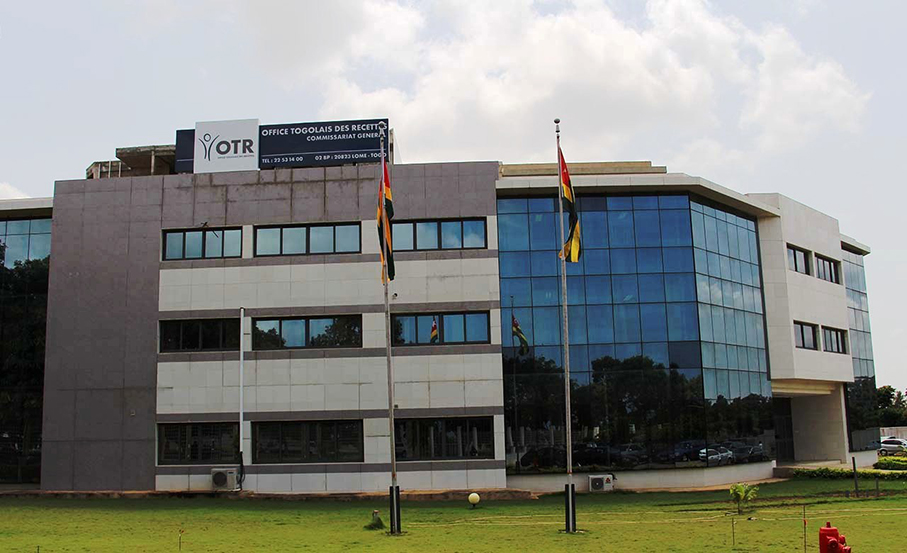
Togo Revenue Authority. Image: Blamé Ekoue
Many Togolese civil rights organisations, as well as opposition political parties, now challenge the new policy of imposing taxes on the informal sector, arguing that it is causing a rise in unemployment. “I never known anywhere in the world where the government pretends to encourage job creation by imposing more taxes on small-scale businesses that are employing two thirds of the labour force,” says Pastor Edoh Komi, chairman of civil rights organisation Mouvement Martin Luther King, named in memory of the great American activist.
Young Togolese people were jobless because their small shops had been closed down, said Komi. “As you know, there is no law regulating the informal sector, so these people will not get any financial compensation when they are sacked.”
His organisation is not alone in believing that imposing new taxes on the informal sector is to blame for rising unemployment. Others include the Veille Economique, an economic think-tank and the Group of Reflection and Action for Dialogue (GRAD), an organisation run by Komlan Alipui, a former economy and finance minister. In June 2017, while visiting Togo, Dominique Desruelle, Africa Deputy Director of the International Monetary Fund (IMF), estimated the country’s economic growth at 5% for this year. Meanwhile, the situation in the informal sector is believed to have led to a decline in living standards.
“The informal sector is not regulated by any law,” said Emilie Johnson, a former cashier at a spare parts shop in Aneho, a town some 70km from Lomé. “It is like a no-man’s land, so when you are sacked or when the business closes, you will suffer for months before getting another job. I am now living with my parents because I cannot afford to pay my rent. My standard of living has drastically deteriorated.”
In 2009, Togo created a regulatory body, Délégation à l’Organisation du Secteur Informel (DOSI), to promote job creation and provide secure incomes for workers in the informal sector. “The goal here is to ensure that businesses operating in the formal sector contribute to the [national] coffers by paying their taxes, and to ensure access to financial resources through banks,” explained Ingrid Awade, the managing director of the organisation.
Though clearly a pillar of the national economy, Togo’s informal sector faced many challenges, including access to finance from the banking sector, Awade told Africa in Fact. To tackle this, the informal regulatory body has set up several mutual funds to support small-scale businesses, as well as to provide social insurance for workers in the informal sector.
In an unprecedented move, the government announced a range of tax breaks this year, aimed at reducing the financial burden of small businesses. These include tax exemptions for computer materials and ICT products as well as a VAT reduction, from 18% to 10%, for some imported basic commodities and foodstuffs like rice, flour, palm oil and sugar. It also reduced the fee payable for registration on the commercial registry from CFA34,400 ($61) to CFA25,400 ($45), which is aimed at encouraging small business operators to register. The authorities also reduced taxes by 1% for all registered businesses.
“This fiscal relief will cost the state CFA15 billion (about $26.6 million). This could reach CFA25 billion (about $44.4 million) in the coming years,” said Esso Wavana Adoyi, a commissioner at Togo’s tax authority.
The government has indicated that it might consider lowering certain VAT rates to boost the informal sector in the coming years. In May this year, Sani Yaya, the country’s minister for economy and finance reiterated the government’s commitment to supporting all the country’s economic sectors. “These measures will enable the private sector to play its role in the economic recovery policy,’’ he added after talks with a range of stakeholders, including economic operators in the formal sector.
But many economic analysts believe that the new policy, which mainly aims at improving levels of tax collection, will make things difficult for businesses operating in the informal sector. Some businesses are already suffering from a lack of funding, which is a drag on economic activities in all sectors (formal and informal). Faced with paying taxes, newly created businesses in the informal sector, which have less access to capital, are already struggling to avoid bankruptcy.
The government has opted to broaden the tax base, following recommendations by the International Monetary Fund (IMF), among other organisations. “This pill will be difficult for our citizens to swallow,” Veille Economique’s Koumou told Africa in Fact.
He argues that the government should instead consider broadening the tax base by supporting the creation of new economic sectors. “But to achieve this, there is a need for competence and an enthusiam for work,” he concluded.
Blame Ekoué is the Togo correspondent for the BBC and for Paris-based media house, ANA. He has also reported for Associated Press and Radio France International. He holds a BA in Communications from the Leader Institute in Lomé. Formerly deputy editor of the West Africa Revue, he has been a contributor to the Lome-based Business and Finance magazine since 2015.



